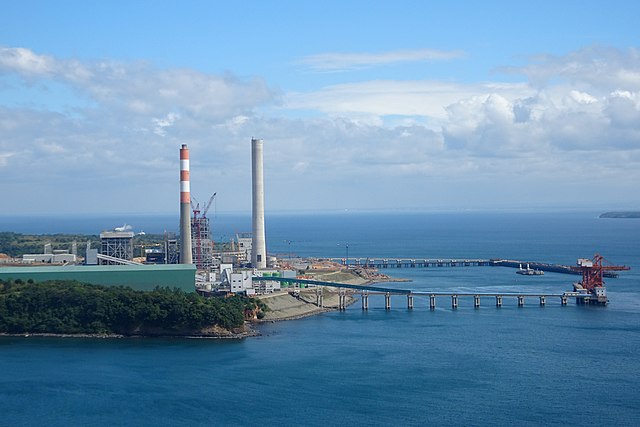Photo: The Mariveles Coal Power Plant, one of four financed by Standard Chartered. Photo: P199, CC BY-SA 4.0, via Wikimedia Commons
Key Points:
- According to a complaint filed with the UK government by human rights and environmental advocates this week, Standard Chartered violated international guidelines for responsible business conduct by co-financing four coal-fired power plants that have devastated local communities in the Philippines.
- The complaint was filed with the UK National Contact Point for Responsible Business Conduct, a government office tasked with investigating breaches of the OECD Guidelines for Multinational Enterprises.
- Local communities have reported increased respiratory and skin disease, land disposession, eviction and impoverishment directly resulting from the construction of the power plants.
- The affected communities and NGOs are calling on Standard Chartered to contribute to the remediation process and strengthen its policy on remediation.
Human rights and environmental advocates filed a formal complaint with the UK government this week accusing Standard Chartered bank of contributing to human rights violations and failing to provide remediation for harms caused by four coal plants it co-financed in the Philippines. The complaint was filed with the OECD’s National Contact Point for Responsible Business Conduct (NCP) in the UK, a government office tasked with investigating breaches of the OECD Guidelines for Multinational Enterprises.
The Philippine Movement for Climate Justice (PMCJ), Inclusive Development International (IDI), Recourse and BankTrack submitted the complaint on behalf of local communities that have suffered a wide range of adverse human rights impacts as a result of the development of coal plants, including forced eviction and loss of livelihoods, air- and water pollution-related respiratory and skin diseases, and intimidation and violence.
Attn. Aaron Pedrosa, Lead Counsel and Head of the Philippine Movement for Climate Justice (PMCJ) Legal Team, said: “Standard Chartered which professes to adhere to core human rights and business principles must live up to its commitment. Where a higher degree of care is expected for high risk investments, SC must not be allowed to get away with murder by funding polluting and environmentally destructive coal plants without being held to account for harms caused to lives, livelihoods, environment, climate and human rights.”
The complainants argue that Standard Chartered contributed to these harms through its irresponsible financing of the plants—specifically, by failing to identify and prevent the harms through effective due diligence and failing to cooperate in the remediation of harms that arose as a result—in violation of its responsibilities under the OECD Guidelines. As the complaint alleges, the bank therefore has a responsibility to contribute to remedy, for example by providing medical assistance, livelihood support and compensation for lost income, and using its leverage with the coal companies it finances to stop and/or mitigate ongoing air, noise and water pollution.
Kate Geary, Co-Director at Recourse, said: “Banks that are prepared to profit from high risk investments must also be prepared to remedy the harms caused to health, livelihoods and the environment by those investments, as Standard Chartered’s own policies says it will. Communities have articulated a clear vision of how those harms can start to be repaired, it is now up to Standard Chartered, and the other financiers of these coal plants, to step up.”
Will O’Sullivan, climate campaigner at BankTrack, said: “After years seeking a healthy return on these dirty investments, Standard Chartered now wants to wash its hands of them. But the bank invested hundreds of millions of dollars to build these four plants, which will dump millions of tonnes of greenhouse gases into the atmosphere over their lifetime. The people living in these coastal areas deserve to be compensated by Standard Chartered and all the other financial institutions that supported the projects for years.”
David Pred, Executive Director of Inclusive Development International, said: “Standard Chartered knew or ought to have known that these coal plants would wreck the environment and cause serious harm to local communities, but it financed them anyway and then ignored our repeated requests to contribute to remediation efforts. In its Human Rights position statement, Standard Chartered claims to provide remedy or cooperate in remediation processes when it contributes to adverse impacts—now is the time for the bank to live up to those words with action.”
Opposition to the coal plants is longstanding and the harm they have caused has been well-established. Standard Chartered has already been made aware of the harms these coal plants have caused. PMCJ has led climate marches that protest the health burden and climate damage resulting from the developments, and nonviolent Greenpeace protesters have been assaulted by guards protecting the Masinloc plant, among those co-financed by Standard Chartered. Tragically, the high-profile murder of Filipino land defender Gloria Capitan occurred after her opposition to coal projects subcontracted by San Miguel Corporation, one of the developers of the coal power plants in this complaint. Standard Chartered has a close financial relationship to San Miguel Corporation, including underwriting multiple bond issuances by the company which are still outstanding. Standard Chartered is the longest established international bank in the Philippines.
It is also not the first complaint that these communities have filed to seek recourse for the harms they have suffered in relation to the plants. An investigation prompted by a 2017 complaint to the Compliance Advisor Ombudsman of the International Finance Corporation (an IFC financial intermediary client was also among the plants’ co-financiers) concluded that the coal plants Standard Chartered helped finance likely caused a range of harms that were “of a significant nature,” including adverse health impacts due to coal ash pollution of the air and contamination of water; impacts on livelihoods due to coal ash contamination; displacement and resettlement related impacts; threats against and intimidation of community activists and inadequate stakeholder engagement and consultation.
Additional Resources:
Our complaint to the UK NCP against Standard Chartered: https://www.inclusivedevelopment.net/wp-content/uploads/2024/03/complaint_to_uk_ncp_standard_chartered.pdf
Joint complaint to the CAO filed against IFC in 2017: https://www.inclusivedevelopment.net/wp-content/uploads/2020/12/Letter-of-Complaint-to-CAO_Phillippines-Coal-final.pdf


